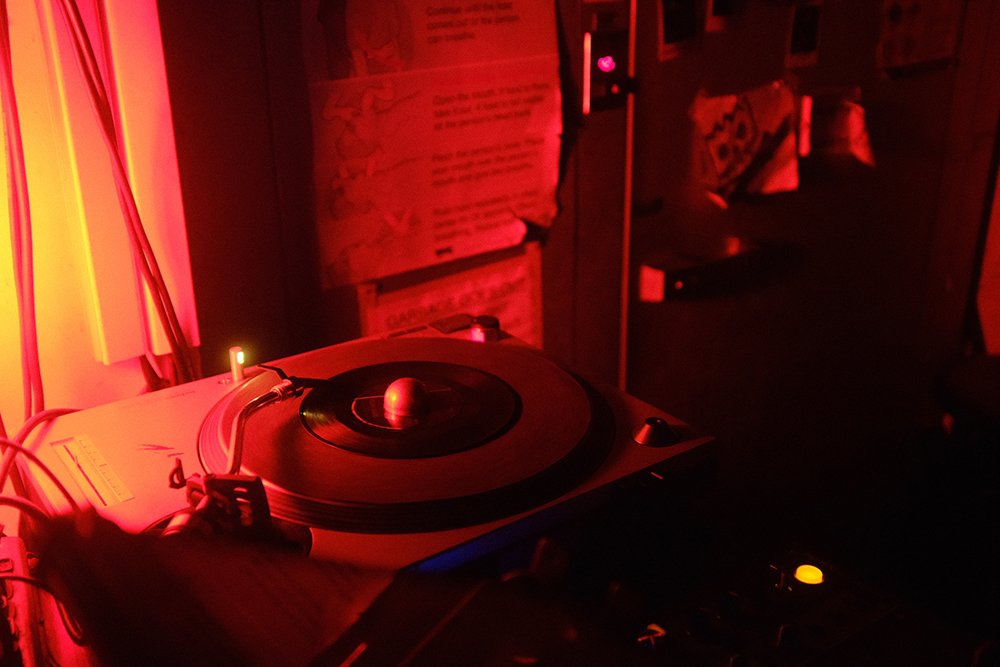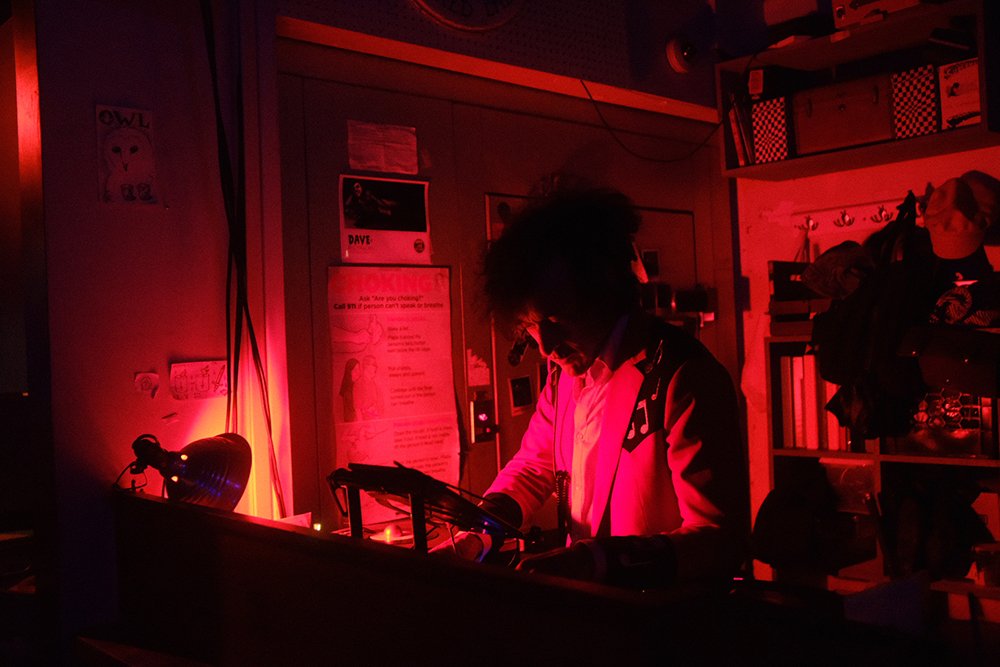Jonathan Toubin is New York City’s Favorite DJ
Photos by Naz Kawakami
If you stop a stranger on the street and ask them who the mayor of New York City is, they’d probably tell you it’s Eric Adams. They’re wrong. It’s Jonathan Toubin.
A man of a million stories, thousands of 45’s, and an infinite knowledge of musical history, Toubin is New York City’s favorite DJ (literally, the people voted). Toubin earned the title through decades of dedicated service providing dance floors across the city—and eventually the world—with rhythm, soul, and rock’n’roll. At any of his many weekly or monthly parties (such as New York Night Train Soul Clap & Dance-Off or Sunday Soul Scream), you will find a packed house and Jonathan at the rotating helm, throwing out gem after gem spun exclusively and stubbornly on vintage 45″ singles.
While there is no doubting his skill as a DJ or the quality of his selections, the dance floor is a fickle place, and it takes a lot to get a party going. I have determined that it is not simply the music, but Toubin himself that is able to energize, mobilize, and charm a crowd. Going to a party with Toubin means free margaritas, sweat drips on the dance floor, and many, many pauses while he greets, hugs, high-fives, laughs and smiles with everyone in the room.
Before interviewing him, I had met Jonathan twice. Both times, I was alone at a party and we made eye contact in the crowd—the sort of negligible eye contact that most ignore. Both times, he extended his hand to me and introduced himself, welcoming me, engaging with me for that moment, inviting me in, and asking me to have a good time, and I did. While at a Sunday Soul Scream party shooting photos for this interview, Toubin shook hands and spoke at length with a group in the crowd. After the conversation ended, he turned back to me and said that he didn’t know who they were, but that he did now. Everyone knows Jonathan Toubin, but even if they don’t, they will soon enough. Jonathan is a good guy and a good DJ, but how do those combine to be the best DJ in New York?
How does one become the best DJ in New York?
Phew! I don’t know if I’m a good DJ yet, but I’m working on it.
I’ll rephrase, how does one get voted the best DJ in New York City.
That was way back and way out of leftfield. I was surprised, I don’t actually know.
How did you get into DJing in the first place?
I was a musician that was going to grad school and I started doing DJ gigs to make money. I didn’t expect it to be anything, I didn’t care about it, I never wanted to be a DJ. Once people found out I was DJing, I knew enough people in music at that time to be able to make a living off of it.
For someone who gets booked to play these huge venues, you have a very non-typical, special flavor of DJing, though. And by that I mean it isn’t shit.
Thanks. I realized back then that I never liked DJs because I didn’t like the music that they played. Coming from a rock ’n’ roll background, when the show would end and it’s time to dance, the DJ would put on top 40 or EDM or whatever, and that wasn’t really what I wanted. Or they’d rehash the hits from the 80s that you grew up on. Nothing wrong with that, it’s just not what I wanted as a dancer. I thought about what I’d like to dance to and immediately thought, ‘If I had to pick something, it’d be soul, funk, R&B,’ all the rawness and emotional intensity and the things that got me into punk as a kid. Music that was sort of outsider music at the time, but had all of the intensity and danceability and passion.
Were you big into those 50’s/60’s records growing up?
I knew enough, but I wasn’t an expert or anything. I was already writing stuff in graduate school about music for different journals and stuff. Put it this way, my knowledge of soul music was limited to 101: Etta James, Otis Redding, James Brown. As I started getting into old rock ’n’ roll and soul, I got really into the 45 format—how it sounded, the rawness, the bigness. Around then, people started going digital, but I was in love with the life that is in these old records. They would record and master each pressing differently so there was variety, the records have skips and scratches that make them unique.
That’s an expensive habit. So you found your niche pretty quickly?
It was definitely an expensive habit, but I learned a lot. Well, I started playing more and didn’t really expect much. The punk bar I was playing at most of the time didn’t really like it, so I started a party in Brooklyn, just for the people that did like it, and that became the Soul Clap and Dance-Off and that went for a long time and got pretty huge. By the time the Village Voice voted me best DJ that one year, I had been playing 300 nights a year for some time.
Jesus! Playing where? Playing what?
I went all around. I’d play after hours, in art galleries, clubs, wherever in this big community. I was shocked to see my name on that ballot with these huge hip-hop DJs. That was pretty weird.
Since you’re all on vinyl, you’ve got to do a lot of planning for what you’re going to bring to a gig with you. How do you choose your genre/selections?
One thing about being good at nightlife DJing is limiting yourself. If you come to my house, I might want to play you Ornette Coleman, but there’s no way I’d play him at a dance party. I think people today look at their Spotify and say, ‘These are my favorite songs, so I’ll play that,’ but there isn’t a lot of cohesion. If you’re a chef, you might know how to cook a lot of stuff, but instead of having a huge menu, if your passion is Italian food and you have something to offer, try and see how good you can make that.
You play a lot but your sets also have a lot of diversity. How do you maintain that—especially considering the limitations you’re putting on yourself?
Well, one thing I’ve found is that basically, Black American music from the mid-50s to the mid-70s has a seemingly infinite well of music, so you don’t ever get bored. Every town had their own bands and records. It’s a lot like punk in that way. I’ve been doing this a long time, but almost every day I meet someone who turns me on to something new or hits me with a new song or record from all corners of America. On Sunday, I brought around 300 records, all representing different ways that the night can go. All similar genres, but there are all kinds of variations and directions we could take the night in. You kind of feel the crowd’s mood and read the room. If they’re ready to go, you have to bring enough fast things to move to, and at the end of the night when people want to get a little sexy, you have to read that and drop some ballads.
How about when you’re off traveling playing gigs?
When I’m on the road, I bring a very small box of records that I know really well. I’ve got very little room to maneuver because I’ve got 85 records to play for 3 hours. It’s a whole different thing. When I’m here, I can fuck up, try out a new record, whatever, because I’ve already got the trust of the dance floor. When I’m out of town, I have to earn the trust of the crowd and it has to be more precise.
You said you were in graduate school, what were you studying?
I moved around a lot. I wound up with an English degree for my BA. In graduate school, I was in American Studies for my MA and History for my Ph.D., but my mentor was a musicologist. I wanted to study music, but I wasn’t interested in comparison so I had a different sort of curriculum. One of my classes was about American Imperialism, I was really interested in not only how music and capitalism work and how it invades these countries, but also how those countries and cultures respond, and how we consume it when it comes back. I’m also really interested in the Marxist element of music, particularly the post-war marketplace. For a while, all of these weird markets opened in these towns and there were democratic, localized marketplaces that major labels didn’t control.
It’s almost anthropological.
Oh man, it’s so interesting. When you hear a record from Detroit from the 50s, very different economy than Detroit in the 60s and thus very different music. At that same time in Chicago and Detroit, polka music was catering to a huge immigrant population. At that time a lot of people were moving up from Mississippi and Alabama to work in the factories and they were bringing their music with them. All of these different people and cultures from different regions are mixing and converging, and they were able to start up a label and put out their music without big label control. It’s fascinating. To me, that is the Golden Age of music.
I mean, with the internet, you can kind of do that today.
Yeah, you definitely can, and you always kind of could. When I was a kid making music, we would put out records, and maybe you’d hear it on a college radio station or something. Back then, it was a little freer than when I was a kid, where there weren’t these huge labels and you could have a local hit become a regional hit become a national hit.
In that regard, music takes its character from the communities it exists in—can you talk about the communal component of your job?
When I grew up, going to the show was as much about the band playing as it was about seeing everyone in the crowd that you knew. It’s about being in that space with the music together. There’s something about music and community that gets lost at a bigger level. I hear that Bruce Springsteen is really good at making a stadium show feel really close and intimate, and that’s amazing, but I think that, ultimately, a little nightclub is the ideal. Me as a dance party guy, a dance party isn’t about the DJ, it’s about the dancers and how they interact.
But doesn’t the DJ often motivate the crowd?
If you’ve got a fun group of people there, I can be awful and they’ll do a great job. If I’ve got a really boring group of people who don’t want to interact with each other, I can have a great set and it’ll still be bad. I got a phone call during the pandemic asking if I’d DJ in my room on live video and I was like, no way. My job and my joy is to feel the people’s emotions and to take them somewhere. If I wanted to just play records, I can do that at home. The people are the ones making culture. The people don’t come for the DJ—the DJ should play for the people.








